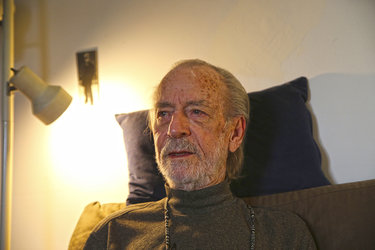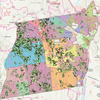A life-time pacifist takes children seriously
NEW SCOTLAND — David Rodney Miller describes himself as an 85-year-old pacifist.
He says, though, that he has been in a war of one kind or another for most of his life and cites his time in the Peace Corps, which he terms “war on war”; his role in the Lyndon Johnson’s war on poverty; and in the war on racism, working with a state Commission on Human rights.
Miller, who lives now in New Scotland, was born in Tulsa, Oklahoma and raised, with three brothers, on a farm in a small town on the outskirts of the city. It was a “very, very poor area,” Miller says in this week’s Enterprise podcast.
Although his family was not poor, Miller went to school with children who were barefoot because they couldn’t afford shoes.
He describes the era as “an exciting time for a young person.” His family lived near an air base so he was “very conscious of the war going on.”
His brothers, like his father, all served in the military. His eldest brother was “in the heat of the fighting” in Iwo Jima.
Miller said his brothers, though, were never critical of him for his pacifism. “We never argued about it …. They obviously knew that I was sincere in what I was saying, and I guess they just decided to live with it,” he said.
What made Miller follow a different path, he said, was the minister at the church his family attended every Sunday. “I took all that seriously,” Miller said of the minister’s pacifism.
The minister was fired by his congregation, both for his pacifism and “his tendency to think of Blacks as ordinary people,” said Miller.
When he came of age, Miller applied for conscientious-objector status and recalls the head of the draft board noting he wasn’t a Quaker and asking, “Where’d you get all those silly ideas?”
Miller says that, in 1955, he was the first person to be admitted to the University of Oklahoma as a conscientious objector. Because the university was a land-grant college, requiring males to undertake military training, Miller said, he suggested a policy would have to be developed, excluding him from such training.
“That’s really kind of where my pacifism became clarified,” he said.
Miller majored in philosophy with a minor in English and his first job after graduating was as a high school English teacher in a town not far from Norman, where the university is located.
Miller was required to teach strictly from the textbook. “I was threatened, in fact, because the school found out about what they considered my radicalism,” he said, so he was made to promise he “would not deviate from the school curriculum and teach kids pacifism or racial equality or any of those things.”
Miller said he “labored under the misapprehension” that he could follow the school rules and “make it work” but ultimately decided he was “not a very good teacher.”
He concluded, “It was a place where I learned a great deal about how not to teach.”
Miller then volunteered for the Peace Corps the year it was established — 1961. According to his identification card, Miller was the 801st volunteer.
He was sent to Thailand, the same year that the United States joined the war in Vietnam. Miller lived in a southern seaport town near the Malaysian border. After studying the Thai language intensely, Miller taught English as a second language to college students.
He later took a staff assistant position where his job was to evaluate requests Thai government officials made for American volunteers.
“We were kind of trophies,” he said of Americans. “Having a volunteer working under you in your program was a feather in the hat.”
So Miller’s job was to be sure there was “real work for the volunteer” and to find out what that work would be.
After his return from Thailand, Miller worked as a recruiter of Peace Corps volunteers before taking a job as a labor union organizer in Virginia, which was followed, in 1964, by work with the Missouri Commission on Human Rights.
That state agency, Miller said, “was set up to deal with racial equality laws.” His job lasted until 1968, “when the wheels came off,” and, Miller said, the Republican governor “lost his heart for the human rights commission.”
Miller then worked as the consumer representative on the Public Service Commission until, he said, the Republican legislature decided that post wasn’t needed. He then came to a state job in New York where he hoped to continue his work with the war on poverty.
“I became acquainted with my counterpart in New York who did the same thing, working with migrants and seasonal farm workers and was told that I could do that kind of work here,” he said, although the job turned out to be less worthwhile than he expected.
When his state job in New York was eliminated in 1980, Miller came full circle and returned to teaching, as a long-term substitute, including at Voorheesville.
“My kids at that time were not happy with school,” he said. “And so I thought, maybe I can say something to improve that, which is what I set out to do.”
This time, Miller taught on his own terms and felt like he made a difference in students’ lives.
“I think an important part of my success as a teacher,” he said, “is I have passed myself off as a man who was looking to do something important for people — children — who he considered important.”
Miller taught “virtually every subject-matter area,” he said, and was well-received because “the kids knew that I could be counted on to assist them in any way I could.”
He would often tell a class of new students, “I knew they had not met me and I had not met them, but I knew something important about them and that was that they wanted to be taken seriously. And so my offer always was, ‘I’ll help you be serious in anything you want to be serious about today.’”
Miller concluded, “That works.”



